Complete a free Georgia warrant search right away with the online tools and dedicated services available throughout this resource.
Public records on wanted individuals are available at state and local levels, but knowing where to look is key to seamlessly retrieving warrant information.
This resource offers free tools for navigating web searches, government databases and various state and county agency records to locate warrants on individuals wanted in Georgia.
Are Warrants Available for Georgia Citizens To View?
Most warrants are available for Georgia citizens to view. The Open Records Act O.C.G.A §50-18-70 et seq makes warrants accessible.1 There are exceptions to the action as it applies to open investigations, attorney-client privilege documents, and names of certain handgun carriers.
Sometimes, authorities seal records; for example, if releasing the information compromises an ongoing investigation – such as declaring a search warrant prior to carrying it out – that information won’t be available to the public until later. The time depends on the status and results of the investigation.
Learning where to find these public records is the first step to learning if someone has an open warrant in the state. It’s possible to find many of them for free and without a third-party search site, which often accompanies a fee. Not all warrant databases are online, and some information gathering may include calling, writing, or visiting an office in person.
Before beginning, it’s important to understand the types of warrants available. These types include arrest, traffic court, bench, probation, child support, search, extradition and fines—and this list is incomplete. So, make sure to identify the type of records you need before starting your search.
Searching for Warrants in GA: What To Know
For the most effective warrant search, having the right details is essential. There are several federal, state and local agencies that may be able to provide this information for free.
When beginning a search, it’s recommended to start wider – searching at the state level and narrowing down to individual counties or cities as more information is revealed.
However, it’s also important to consider the type of offense the potential warrant relates to; county sheriff’s departments and police typically serve as peace officers, addressing crimes that took place within their jurisdiction, while state and county law enforcement officers cover a larger area and have a wider remit.
Agencies need certain information to fulfill the request. Typically, researchers need the following information when embarking on a journey to complete a cost-free warrant lookup:
- Name: When searching for warrants, it’s important to use the full name (including middle name and maiden name) to narrow down the search.
- Date of Birth: Another blank to fill in is the birthdate. Some searches may require this information, such as the Georgia government portal and federal sites, to get accurate information.
- Location: Georgia is a large state, having 159 counties, so any bit of information can increase the chances of accurate results.
Name, date of birth, state and city are essential pieces of information necessary to complete the search, but certain circumstances can require additional details, such as when investigating people with common last names. A middle name or middle initial is helpful in these situations.
An exact address or prior location can help reveal accurate search results if possible. If you don’t have enough information, state and local agencies may not be able to help until you can get specifics on the person you’re interested in looking up.
Warrants may be issued for several different reasons, as will be explained in detail later in this resource. While it can be helpful to know who issued the warrant and what it’s for, in general, the principles of performing a search are the same regardless of its type.
How To Carry Out a Georgia Warrant Search: See if You or Someone Else Is Wanted
When conducting a free warrant search for someone, knowing how to identify sources is vital. Many states offer this online through official government websites at the state and federal levels. Some states offer warrant listings with various agencies, such as child support or orders from the Supreme or other court systems.
However, there isn’t a state website to search for such records in Georgia. Instead, many counties collect and display information through their sheriff’s office.
Anyone can access criminal warrant information in Georgia through the county sheriff’s offices. These records are available at no cost on many county websites and only list those that are open.
Additionally, public data may be available by phone and in person for counties without online access. Some information may be available over the phone with the right identification. If the agency can’t provide the details by phone, they’ll offer mail or in-person instructions.
However, if the person checking in person has an open warrant, they can be taken into custody immediately.
Below is a list of how to access records from some of the largest counties across the state.
Fulton County: Anyone interested can run a Fulton County warrant search to find wanted individuals in the most populous county in Georgia. The Magistrate Court Criminal Division handles warrants. To inquire about warrants, contact the Criminal Division Office through phone at 404-613-5360. Having necessary information, such as an individual’s name and date, can facilitate the process of obtaining warrant information.
Warrant information can also be obtained from the Official Custodian of Records through the Online Record Request Portal. For questions, call 404-612-0281.
Alternatively, the official custodian of records can be contacted at:
Office of the County Attorney
141 Pryor Street, S.W., Suite 4038
Atlanta, Georgia 30303
Email: [email protected]
Clayton County: This county has a similar process to records searches. Warrant information can be accessed through the Clay County Magistrate Court; the court offers an Online Criminal Case Record Inquiry Portal available to the public free of charge.2
Clay County Magistrate Court
Record Division
9151 Tara Boulevard
Jonesboro, GA 30236
Phone: (770) 477-3444
Fax: (770) 473-5750
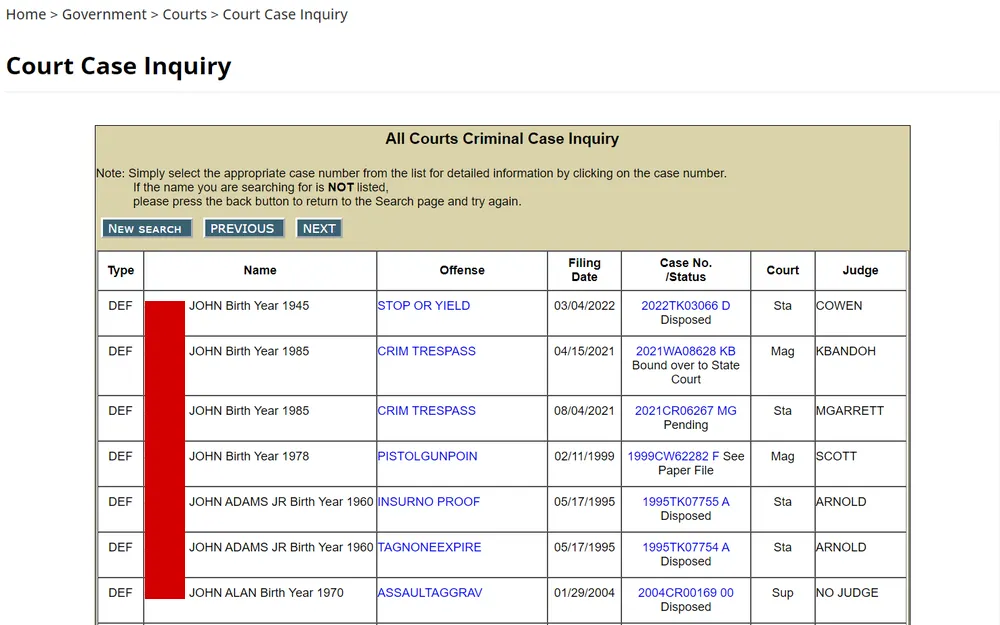
Alternatively, requests can be made through the Online Public Record Request.
Updates go to the My Records Center portal, making it easy to track. This online tool requires users to provide information to create a digital account. For individuals completing a Georgia warrant lookup for themselves, admission of contact or other communications may result in an arrest.
Cobb County: In the populous Cobb County, the Magistrate Court provides a Warrant Inquiry page available to members of State Bar of Georgia.3 For more information, refer to the instructions for looking up wanted persons in Cobb County, or contact the Magistrate Court Warrant Division at (770) 528-8906. The clerk of court can be contacted by email at: [email protected].
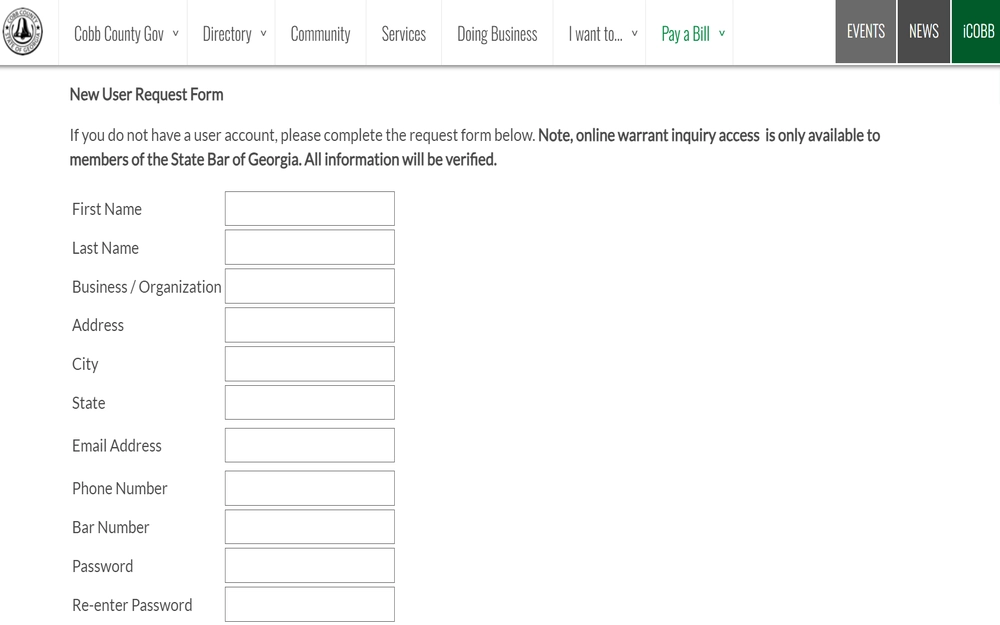
Appling County: Appling County offers a full list of people with active warrants by name in alphabetical order.4 The list is maintained by the Appling County Sheriff’s Office. It also lists corresponding charges, allowing viewers to see why or where the warrant was issued.
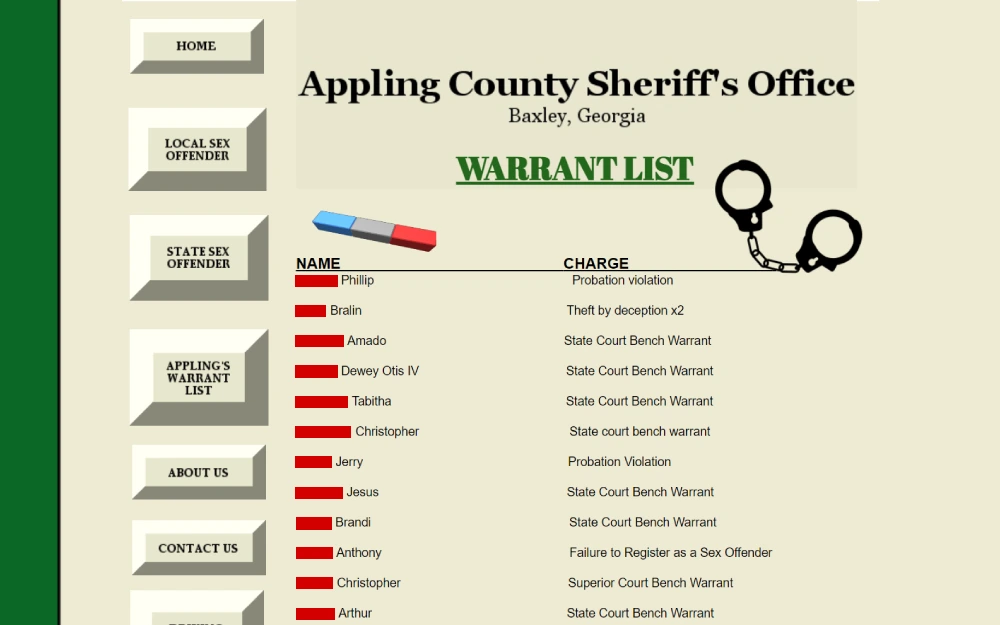
Interested parties can also send a records request to [email protected].
Alternatively, the sheriff’s office can be reached using these contact details:
Appling County Sheriff’s Office
560 Barnes Street, Suite B
Baxley, Georgia 31513
Phone: 912-367-8120
Gwinnett County: Citizens are empowered to find warrant information on anybody in Gwinnett County, either online or in person. In addition to the previously linked resource on accessing such records, patrons can also reach out directly to the Gwinnett County Sheriff’s Office for further insight:
Gwinnett County Sheriff’s Office
2900 University Parkway
Lawrenceville, GA 30043
Phone: 770-619-6500
Another option is to complete the county’s online record form, which may offer an alternative path to get warrant information for Gwinnett’s surrounding areas.
Cherokee County: When obtaining information about warrants in Cherokee County, the Sheriff’s Office Warrant/Civil Unit is an option. Contact the department for more information at (678) 493-4251. Records can also be obtained via online request.5
The website suggests visitors review the Georgia Opens Records Acts, sections 50-18-17 and 50-18-71, before searching or making any inquiry.
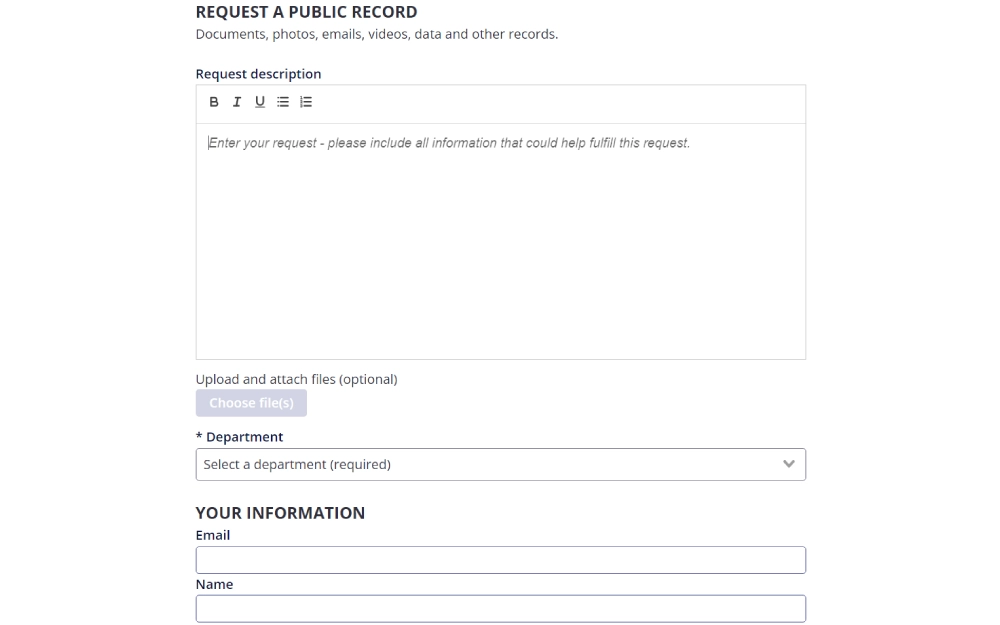
The county office refers individuals to the Cherokee County Clerk of Courts for all judicial services, including warrant information. The clerk can also be reached via phone at 678-493-6511 or in writing at:
Cherokee County Court Clerk
90 North St, Suite G-170
Canton, GA 30114
Forsyth County: Forsyth County has an online system for accessing all public information, which can include warrant assistance. After receiving the request, it can take 3 business days for a response, and there may be a cost to print the documents.
Additionally, the Forsyth County Sheriff’s Warrant Unit may be able to provide information regarding current information. However, this could result in the immediate arrest of a person with an open arrest warrant. Contact the Forsyth County Sheriff’s Office at 770-781-3066 to speak with the warrants clerk.
The records unit can be contacted by email at [email protected].
Hall County: The Hall County Sheriff’s Office offers an open records request through its website. To access the information, the following is necessary:
- First Name
- Last Name
- Street Address
- Phone Number
- Email Address
For criminal inquiries, the Warrant Unit may offer more assistance. Call 770-531-6907 or visit the Hall County Sheriff’s Office Jail Division at:
Hall County Sheriff’s Office Jail Division
1700 Barber Road
Gainesville, GA 30507
Phone: 770-531-6904
Coweta County: Coweta County requires all warrant requests to go through the sheriff’s office in person or through a phone call to the non-emergency line at 770-254-3911. The address is listed below:
Coweta County Sheriff’s Office
560 Greison Trail
Newnan, GA 30263
Henry County: For warrant information in Henry County, the sheriff’s office in McDonough, Georgia, runs the open records department where public documents are available during regular business hours. Individuals can email a request to [email protected] or fax the PDF request form available on the website to 770-288-7116.6
Written correspondence and in-person requests go to:
Henry County Sheriff’s Office
ATTN: Open Records
120 Henry Parkway
McDonough, GA 30253
Look Up Warrants Issued By Municipal Agencies in Georgia
It’s possible to get warrant information through other local governments. While it’s not available for all municipalities in the state, some populous towns provide access to warrant information to the public.
Warrant information is usually a matter of public record and, therefore, available under the Open Records Act (ORA). However, information about a warrant may be withheld if the warrant pertains to an ongoing criminal investigation.
Most locations advise interested parties to a Freedom of Information Act request for the data they’re looking for and don’t have a department or website dedicated to warrant searches.7 Action to enforce the ORA can only occur following a request made in writing. Most local websites with online databases require registration and specific information, as mentioned above, to complete the search.
All searches at the courthouse or other municipal buildings may require a nominal cost or fee to obtain the records.
| Resource | Address | Phone Number |
| City of Atlanta Municipal Court | 150 Garnett Street SW Atlanta, GA 30303 |
404-954-7914 |
| Municipal Court of Columbus | 100 Tenth Street, 8th Floor Tower Columbus, GA 31902 |
706-653-4378 |
| Municipal Court of Augusta | 735 James Brown Boulevard, Suite 1500 Augusta, GA 30901 |
706-821-2448 |
| Richmond County Sheriff | 400 Walton Way Augusta, GA 30901 |
706-821-1000 |
| Macon-Bibb County Government Center | 700 Poplar Street, Suite 204 Macon, GA 31201 |
478-751-7260 |
| Chatham County Clerk of Superior Court | 133 Montgomery Street, Room 304 Savannah, GA 31401 |
912- 651-3617 |
| Municipal Court of Sandy Springs | 1 Galambos Way Sandy Springs, GA 30328 |
770-730-5600 |
Retrieve Federal Warrant Information for GA & All Other States
No-cost warrant information isn’t limited to state and county searches. Individuals can learn about open warrants at the federal level through different agencies.
The Bureau of Alcohol, Tobacco, Firearms & Explosives provides a Warrant Lookup for name, alias and location, allowing anyone to search by state.8 Additionally, it’s possible to check for specific field offices where the warrant was issued. There are currently warrants for Georgia with the ATF.
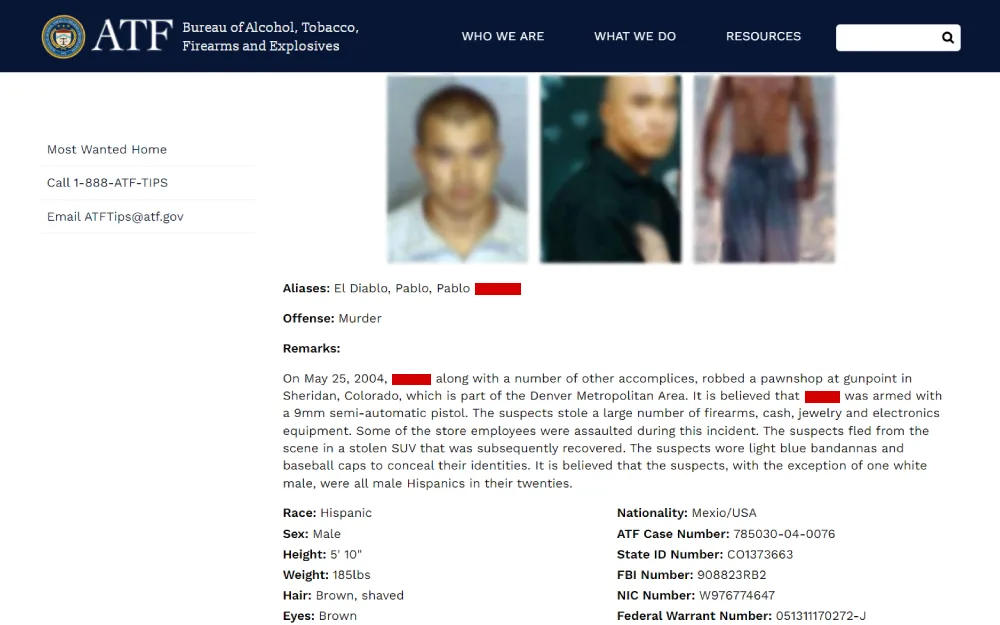
Another option is the Drug Enforcement Administration (DEA). It’s possible to search by division and sex. The DEA fugitive list has several people wanted for federal drug violations in the Northern Division of Georgia.
The Federal Bureau of Investigation (FBI) maintains a Top 10 Most Wanted List, and the U.S. Marshals Service maintains a list of the nation’s 15 Most Wanted Fugitives.9 The individuals on these lists are considered armed and dangerous and/or wanted for major crimes.
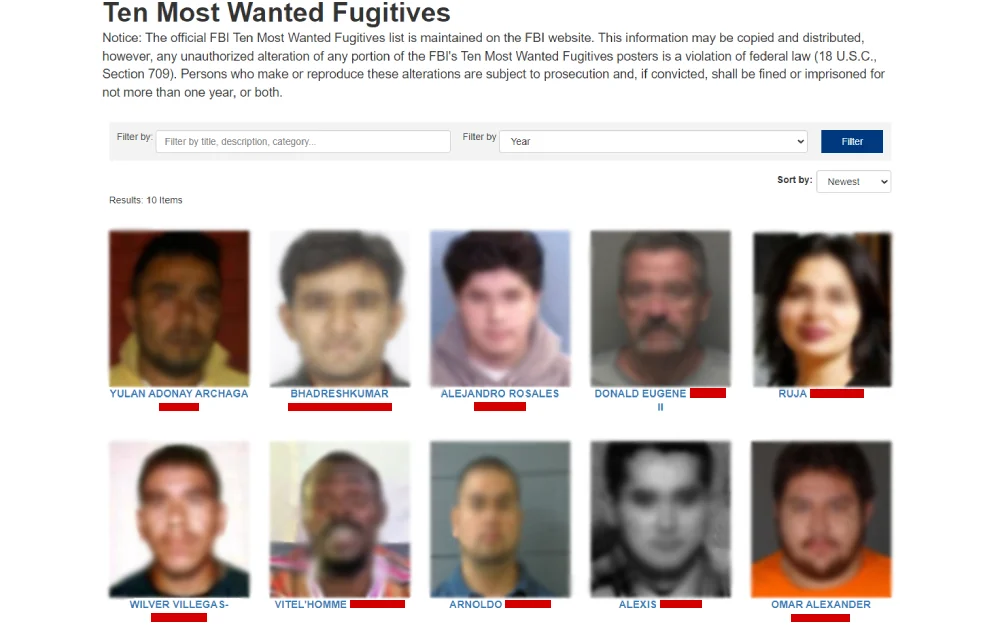
Individuals looking for more resources can try utilizing the Public Access to Court Electronic Records (PACER) tool. This database allows the user to search by name by selecting ‘case number’ and taking the option for ‘docket sheet’/docket report’ and/or ‘history/documents.’ PACER isn’t free and charges by the page.10
To obtain federal warrant information for Georgia outside of these agencies, it’s best to try a FOIA request through the U.S. Marshals Service. The marshals don’t issue federal warrants but do execute them, and an attorney can assist with the process of making a FOIA request.
Different Types of Warrants in Georgia & What Each Means
People can find various documents when completing a free warrant search in Georgia. Part of understanding how to search for these records in Georgia includes acknowledging the differences. It’s common to assume all warrants are for criminal arrests.
However, law enforcement agencies issue these only when suspecting criminal violations. Below, you’ll find some of the various types to know when searching through records.
- Arrest Warrant: Law enforcement agencies issue these only when suspecting criminal violations.11 These can be for a misdemeanor or a felony crime.
- Bench Warrant: These are different from an arrest warrant in terms that a person only has to fail to appear in court for any reason to have one issued. A bench citation allows any law enforcement officer to arrest and bring the person to court. These warrants can include missing jury duty.
- Probation & Parole Violation Warrants: These are common when someone on probation or parole breaks the terms of their release. The warrant is issued for non-compliance and can send a person back to jail for the violation.
- Traffic Warrants: From unpaid speeding tickets to parking violations, traffic warrants can cause further legal complications. These are available to the public, like arrest, bench and probation records.
- Child Support Warrants: A child support enforcement order may involve a warrant if there is a significant amount of unpaid court-ordered child support.
- Capias & Capias Pro Fine Warrants: These Georgia records are lesser known and involve the arrest for either a court appearance or failure to pay a judgment. Judgments can be for criminal or civil cases and result in the detention of the individual.
- Fugitive Warrants: As the name suggests, this involves a person who has evaded prosecution and fled the jurisdiction. If a fugitive warrant is issued, law enforcement in any jurisdiction can detain the individual and hold them.
- Search Warrant: These allow law enforcement officials to search whatever is listed specifically in the document. It can include a residence, business, vehicle or a person, which may show evidence of a crime. If anything is found that can incriminate or prove a crime, the search warrant also allows the officer to seize the evidence.
These are all active warrants, which means the issue, whether it’s a criminal, traffic or monetary matter, hasn’t been resolved, and the person can still be arrested immediately upon inquiry.
The Process for Resolving Warrants & Reporting Persons of Interest in Georgia
Anyone can search for warrant details on themselves or another person. The next step depends on who the warrant is for and the reason for it.
If the warrant is for someone else, it may not be best to notify them. Instead, if there’s a potential for danger, there’s a safer option. Anyone can advise law enforcement of a potential warrant and provide pertinent information available to help take the person into custody.
Contact the Georgia Bureau of Investigation Investigative Division’s tip line at 1-800-597-8477 or submit a tip online.12
When completing the online form, it’s important to note it’s not anonymous. However, it is confidential. The personal contact information is for law enforcement seeking additional information.
It’s vital to address a warrant as soon as possible after it’s discovered. Although learning about an open warrant can be stressful and confusing, the faster it’s resolved, the better.
There are different steps to take to resolve the warrant successfully for oneself. When an individual has a warrant issued against them, it is crucial to take immediate action to resolve the issue.
The first step in resolving a warrant involves determining the reason behind its issuance and assessing the available options for addressing the situation. Before reaching out for legal advice, complete the research necessary to verify the status of the warrant in Georgia. After conducting a thorough warrant search, it is possible to obtain the necessary information to resolve the issue without requiring legal aid or the help of an attorney.
A few options are available if there is an outstanding warrant in Georgia. For example, if it’s for a fine, simply paying the balance can fix the problem and eliminate the potential for arrest or forfeiture of assets.
Additionally, some people may search for information and discover they have an outstanding warrant even though it was previously paid. These situations simply require proof of payment.
For more serious matters, such as misdemeanor or felony arrests, it may be best to seek legal representation. A lawyer can help clients understand their rights and options. They can guide them through the process of turning themselves in, securing bail and scheduling a court date.
In some cases, the best course of action for someone with an outstanding warrant could be to communicate with a bail bondsman and family members, or seek legal aid before turning themselves in.
Professionals also have access to resources, such as help to obtain a bail bond; in addition, they can prepare them for situations where an immediate release isn’t possible, following the results of a Georgia warrant search.
Residents wanting to view additional insights on anyone throughout the state are advised to check out both the overview of obtaining all free public records in Georgia (property, vital records, background checks, and more) as well as the GA arrest and criminal history search tutorial.
References
1National Freedom of Information Coalition. (n.d.). Georgia FOIA Laws. Retrieved April 4, 2024, from <https://www.nfoic.org/georgia-foia-laws/>
2Clayton County, Georgia. (2024). Court Case Inquiry. Retrieved April 4, 2024, from <https://www.claytoncountyga.gov/government/courts/court-case-inquiry/>
3Cobb County, Georgia. (2024). Warrant Inquiry. Retrieved April 4, 2024, from <https://www.cobbcounty.org/courts/magistrate/warrant-division/warrant-inquiry>
4Appling County Sheriff’s Office. (n.d.). Warrant List. Retrieved April 4, 2024, from <http://www.applingcoso.com/ACTIVE-WARRANT-LIST.html>
5Cherokee County, Georgia. (n.d.). Request a Public Record. Retrieved April 4, 2024, from <https://cherokeecountyga.nextrequest.com/requests/new>
6Henry County Sheriff’s Office, Georgia. (2022, June 16). Open Records Request Form. Retrieved April 4, 2024, from <https://henrycountysheriffga.gov/wp-content/uploads/2022/10/OpenRecordsFillableForm_6.16.22.pdf>
7United States Department of Justice. (n.d.). FOIA. Retrieved April 4, 2024, from <https://www.foia.gov/>
8Bureau of Alcohol, Tobacco, Firearms and Explosives. (n.d.). Most Wanted. Retrieved April 4, 2024, from <https://www.atf.gov/most-wanted>
9Federal Bureau of Investigation. (n.d.). Ten Most Wanted Fugitives. Retrieved April 4, 2024, from <https://www.fbi.gov/wanted/topten>
10Public Access to Court Electronic Records (PACER). (n.d.). PACER Pricing: How fees work. Retrieved April 4, 2024, from <https://pacer.uscourts.gov/pacer-pricing-how-fees-work>
11National Center for State Courts. (n.d.). Warrant Types. Retrieved April 4, 2024, from <https://www.ncsc.org/wdmtoolkit/business-processes/warrant-process-flow/warrant-types>
12Georgia Bureau of Investigation. (n.d.). Submit Tips Online. Retrieved April 4, 2024, from <https://gbi.georgia.gov/submit-tips-online>
